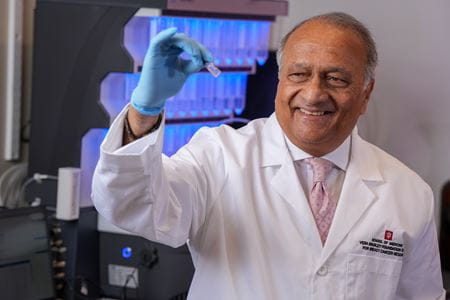INDIANAPOLIS — A renowned innovator of vaccines for cancer treatment has joined the Indiana University Melvin and Bren Simon Comprehensive Cancer Center and the IU School of Medicine.
Pravin Kaumaya, PhD, internationally recognized for creating a cancer treatment blueprint that uses peptides in vaccines to block the growth and spread of cancer, has been named the Vera Bradley Foundation Professor of Breast Cancer Innovation at the cancer center.
"We could not be more excited about Dr. Pravin Kaumaya and the knowledge, experience and expertise he brings," said Stephanie Scheele, executive director of the Vera Bradley Foundation for Breast Cancer. "Knowing that some of his research and work, specifically regarding breast cancer, are already in clinical trials excites us. The addition of Dr. Kaumaya moves us one step closer to a future free from breast cancer."
Kaumaya serves as director of the Immuno-Oncology and Vaccine Immunotherapy Laboratory at the Brown Center for Immunotherapy and is a researcher with the Experimental and Development Therapeutics and Hematopoiesis and Hematologic Malignancies research programs at the cancer center.
"We are creating a paradigm shift in cancer therapy with novel chimeric B-cell-epitope vaccines," he said. "Being part of the IU Simon Comprehensive Cancer Center will accelerate the process of translating our discoveries to patients."
He is also a professor of microbiology and immunology at the IU School of Medicine.
Kaumaya has developed numerous cancer vaccines in his three-decade career and translated two breast cancer and colon cancer vaccines into Phase 1 clinical trials. The other vaccines might one day be used in ovarian, lung and gastrointestinal stromal tumor cancers.
Kaumaya said he will continue research begun at Northwestern University and The Ohio State University Comprehensive Cancer Center - Arthur G. James Cancer Hospital and Richard J. Solove Research Institute.
"I'm proud of our recent work in the field of immuno-oncology," he said. "We've developed novel peptide vaccines for several checkpoint inhibitors, such as two proteins — PD1 and CTLA-4 — recognized as regulators of immune responses by 2018 Nobel Prize winners Drs. James P. Allison and Tasuku Honjo. The combination of these vaccines could offer safe medications for cancer in a number of different indications."
Kaumaya holds more than 25 patents for peptide cancer vaccines and immune-therapeutic technologies, which are at the forefront of cancer treatment and prevention.
"Current targeted therapies face many obstacles in the clinic: the rapid development of resistance, high toxicity rates, on- or off-target effects and weak efficacy," he said. "The promise of peptides will invigorate drug innovation and discovery and challenge the ingenuity of researchers to develop cancer cures and future therapies that are safe and non-toxic. Our novel targeted immunotherapy approach overcomes these obstacles and holds the promise of making a major leap in the clinical treatment of cancer."
Kaumaya earned a bachelor's degree at the University of London, a doctorate at the University of Portsmouth in Hampshire, England. He did postdoctoral training at the University of Texas at Austin, UT's Drug Dynamics Institute and Northwestern University. He has held academic appointments at numerous universities since 1988, most recently with The Ohio State University where he was a tenured full professor.
He is an elected fellow of the American Association for the Advancement of Science, and he currently serves on the editorial boards of Vaccines, Frontiers in Oncology, Frontiers in Immunology, and the International Journal of Peptide Research and Therapeutics. He has edited six books or monographs on peptides and served on at least 10 national medical committees and dozens of peer review panels.




